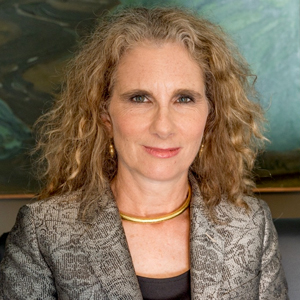
We at the Association for Accessible Medicines are proud of our rich heritage. The pioneers who forged our industry deserve to be heralded. Some are still with us; some are gone. Please keep reading about them and their contributions to society.
Visionary. Motivator. Entrepreneur. Philanthropist. All are fitting descriptions of the industry pioneer we recognize today. But perhaps the word that best exemplifies our honoree is trailblazer—a person who risks taking a path that is not already there and leaves behind the path for others to follow. Here is the story of Jean Hoffman, who after 40 years of innovation and astute leadership, continues to work tirelessly to improve the lives of others.
Jean’s career began in 1980 at the U.S.-China Business Council (USCBC), a Washington, DC-based organization that advises American companies doing business with China. She was fresh out of school with a bachelor’s degree (with honors) in East Asian History and Government and Legal Studies from Bowdoin College in Maine. This education, coupled with her Mandarin Chinese language skills, adeptly qualified Jean for her new job. And with the establishment Sino-U.S. diplomatic relations a year earlier, there was plenty of work to do at the Council.
The path that led Jean to the generic industry began with her first assignment at USCBC. She was charged with taking a delegation of chemical engineers from China to various pharma companies throughout the U.S. Jean recalls, As the lowest kid on the totem pole, I was assigned a delegation no one wanted because the senior factory leaders couldn’t sign contracts with US companies. The ‘sexy’ industries in those early days of American companies entering China were aviation or oil and gas; I got stuck with the chemical engineers.
The knowledge and experience she gained while working for the U.S. China Business Council opened new career opportunities. In 1982, Jean joined the Swiss-Asian Zuellig Group to lead API sourcing from China for their U.S. OTC distributor and she was later promoted to leadership of all China business development activities for Zuellig companies world-wide. Soon after, she was named CEO and a member of the board of directors of ZetaPharm, a Zuellig subsidiary, where she developed a new strategy to supply APIs from Europe and China for the nascent U.S. generic drug industry.
It was during this time that the Hatch-Waxman amendments to the Federal Food, Drug and Cosmetic Act became law in the U.S., and the American generic medicines industry was beginning to take off. As the number of generic manufacturers increased, so did the need to find high quality, competitively priced sources of APIs that could be approved by the FDA in an ANDA, given the lack of a US based API manufacturing industry. Due to the dearth of information on foreign sources and need for API, developers to support patent challenges, sourcing active ingredients became a major challenge for generic developers. Prior to Hatch-Waxman, API procurement was not a significant problem because there were relatively few approved generics on the market. In fact, in 1983, the year before Hatch-Waxman became law, less than one third of the 300 top-selling, off-patent branded drugs had generic competition. The irregular and uncertain “paper NDA” generic approval process that had been in place since the mid-1960s was woefully inadequate when it came to incentivizing generic drug development.
But the Abbreviated New Drug Applications (ANDA) process created by Hatch-Waxman was a game changer. In the year following its enactment, 1,069 ANDAs were submitted to the FDA seeking approval for a host of new generics. That was a lot of drugs and every one of them had to start with an API,
Jean said.
Recognizing the API procurement challenge and determined to do something about it, Jean left ZetaPharm and founded Newport Strategies. Newport became a global proprietary health care information technology (HIT) system used by generic companies worldwide to target products to develop, identify API sources, find business development opportunities, and analyze generic competition. AAM Board member Joe Renner, who 30 years ago help start Zydus Pharmaceuticals and today serves as Chairman & CEO of Zydus USA, told me that Jean provided the bridge that was needed to connect young generic companies with chemical ingredient suppliers. He said Jean contributed immensely to the early growth of the generic industry.
Newport was acquired by Thomson Reuters in 2005, but that did not mark the end of Jean’s career in the generics space. I wanted to do something new and apply my understanding of how data could be used to target niche, high barrier to entry products that had limited market competition,
Jean said. So in 2006 she founded Putney, Inc. and built a pipeline of products that made the company America’s leading provider of generic drugs for pets. Among Putney’s investors was NewSpring Capital, whose operating partner, generic industry pioneer Bruce Downey, provided exceptional advice as a Putney board member. Jean ran Putney for 10 years, competing against the branded veterinary drug companies to bring more affordable pet generics to market. Said one industry veteran, You can’t keep up with Jean. She’s always building. And when it comes to managing a business, she knows the value of listening to team members, but she also knows there are times when you can’t wait for consensus, you just have to pull the trigger and act. And that’s what’s makes Jean so successful.
Jean has completed executive management programs at Harvard Business School, Stanford Graduate School of Business, and the Columbia Graduate School of Business. Among her many honors are being named the New England Ernst & Young 2014 Entrepreneur of the Year in Life Sciences and inclusion in Goldman Sachs’ Builders & Innovators summit honoring the 100 Most Intriguing Entrepreneurs. Jean currently serves on several boards, including the Cummings School of Veterinary Medicine at Tufts University and MedRhythms, a digital therapeutics company that uses AI to build neurologic interventions. Her contributions have been featured in Time Magazine, The Atlantic, and The New York Times.
One more note: Jean knows the importance of giving back. The Hoffman Family Foundation supports community, health and cultural causes, including the University of Southern Maine’s Promise Scholarship Program, that believes anyone — regardless of circumstances — who has the drive to succeed and the willingness to work hard, deserves a chance at higher education.
For all that she has done and continues to do, we say, Thank you, Jean Hoffman.

By Bob Billings. Active in the pharmaceutical industry for more than 25 years, Bob held various positions at the Generic Pharmaceutical Association (now the Association for Accessible Medicines) from 2007 through June 2015, including Interim President and Executive Director.
